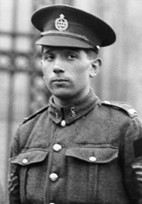With Armistice Day having just passed recently, I thought it appropriate to commemorate a man from the north-east who not only fought in the ‘War to end all Wars’ but did so with such valour that he was awarded the country’s highest decoration, the Victoria Cross
Colin Barron (pictured left) was born on 20th September 1893 in Boyndie in Banffshire to Maggie, a cleaner, and William Cowie, a soldier. Illegitimacy being much frowned upon in those days, he raised in a large household by his grandparents Joseph Mary Barron along with his brother Alexander Barron and many other half-siblings and aunts and uncles.
He emigrated to Toronto in March 1910 and worked the Canadian railway before enlisting in the 48th Highlanders militia unit in May 1913. With the outbreak of war in 1914, he subsequently volunteered in January 1915 for the Canadian Expeditionary Force and was sent to France. He was clearly a good soldier, for he was promoted to Lance-Corporal on 8th April 1917, the same day that the Canadian Corps, in exceptionally fierce fighting, captured Vimy Ridge.
Later that year, on 6th November 1917, the Canadian First Division took part in the horrific battle of Passchendaele, with a specific objective being a building called Vine Cottage. The Canadians were driven back and it was then that Colin lead the action that lead to his Victoria Cross. The official citation in the London Gazette tells us,
“For conspicuous bravery when in attack his unit was held up by three machine-guns. Corpl. Barron opened on them from a flank at point-blank range, rushed the enemy guns single-handed, killed four of the crew, and captured the remainder.
“He then, with remarkable initiative and skill, turned one of the captured guns on the retiring enemy, causing them severe casualties. The remarkable dash and determination displayed by this N.C.O. in rushing the guns produced far-reaching results, and enabled the advance to be continued.”
He was only 24. His gallantry that day, along with his conduct throughout, led to promotion to Sergeant. Unlike so many hundreds of thousands, he survived the First World War, returning to Canada in April 1919 to re-enlist in the 48th Highlanders in 1921, rising to Colour Sergeant Major 10 years later in 1931. After the war, Colin married and had two daughters while serving in a variety of military roles, including a time with the Provincial Police at Kitchener, Orangeville and Niagara Falls. Then, on the outbreak of the Second World War, aged 46, Colin joined the Royal Regiment of Canada who occupied Iceland at the start of the conflict.
He eventually retired from active service as a Lieutenant and joined the Canadian Corps of Commissionaires, working at the Canadian Broadcasting Corporation, the Don Jail, and Sunnybrook Hospital. He was also among the Commonwealth holders of the Victoria Cross who attended the Coronation of Queen Elizabeth II. All in all, a remarkable man who, from his north-east roots to his world-wide military service, is someone our area can remember with great pride.
Julie Skinner, Resourcing and Benefits Manager, RGU


